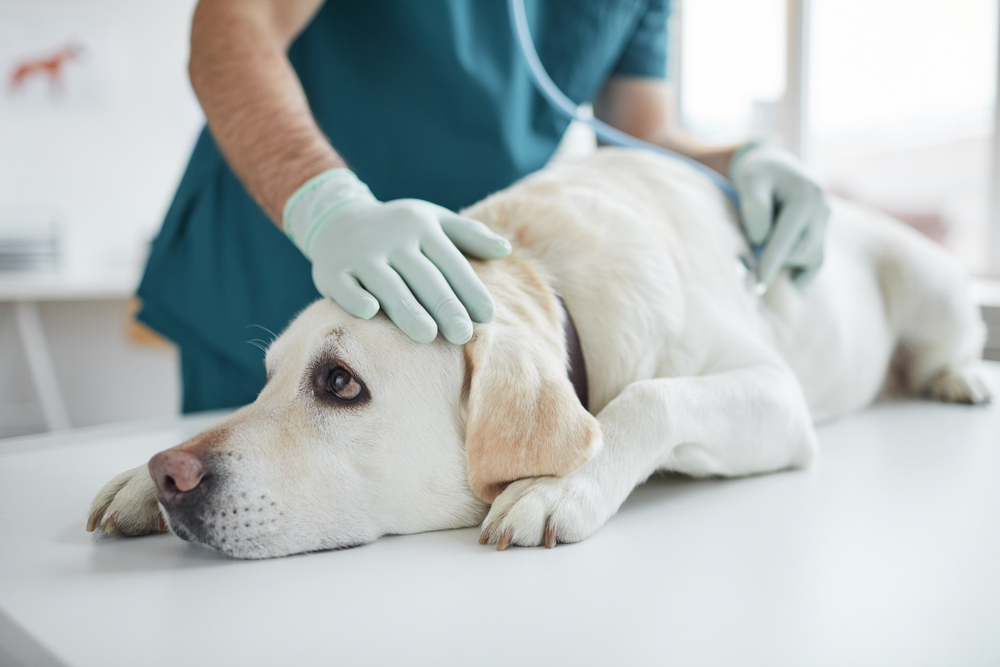Dog diarrhea is a common problem that, if not addressed appropriately, can result in many concerning issues, including dehydration and electrolyte imbalances, and, in some cases, serious health complications. Our Midtown Veterinary Hospital team wants to provide information about what causes dog diarrhea and how these situations should be managed.
Dietary indiscretions cause dog diarrhea
Dogs typically are not picky about what they eat, and their dietary indiscretions commonly cause diarrhea. These situations can most likely be managed without a trip to the veterinarian. Factors to consider include:
- Is your dog acting normally? — If your dog is lethargic, not eating, or exhibiting other concerning signs, such as vomiting or pain, you should seek veterinary care.
- Are your dog’s vaccinations up to date? — Vaccinations protect your dog from serious illnesses that can cause diarrhea, and if they aren’t up to date, you should seek veterinary care to ensure they aren’t affected.
- How old is your dog? — If your dog is a puppy or a senior dog, a mild diarrhea bout can have serious consequences, and you should seek veterinary care.
- Does your dog have pre-existing health issues? — If your dog has other health problems, such as kidney disease, cancer, or liver disease, you should seek veterinary attention.
If you have considered these factors and determined you can manage your dog’s diarrhea at home, recommendations include:
- Fasting your dog — Fast your dog for about 12 hours to allow their gastrointestinal tract to heal and recover.
- Resting your dog — Avoid strenuous activity, and let your dog rest in a quiet area.
- Hydrating your dog — When your dog has diarrhea, hydration is critical to prevent health complications, so ensure they always have access to fresh, clean water. You can also provide rice water to potentially speed their recovery.
- Monitoring your dog — If your dog’s condition worsens, or their diarrhea doesn’t resolve in 24 hours, you should seek veterinary care.
Intestinal parasites cause dog diarrhea
Parasites, such as roundworms, whipworms, hookworms, giardia, and coccidia, can cause dog diarrhea, with infected puppies and immunocompromised dogs at higher illness risk. Roundworms can sometimes be observed in your dog’s feces or vomit, but other parasites are microscopic. Recommendations to manage intestinal parasites include:
- Fecal checks — Allow our veterinary team to perform a fecal check on your dog every six months to ensure they are parasite-free. If we find parasites, our veterinary professionals will prescribe an appropriate treatment regimen to eliminate the infection.
- Parasite prevention — Provide year-round flea, tick, and heartworm prevention medications, which typically also protect your dog against common intestinal parasites.
- Sanitation — Remove fecal material from your dog’s environment, and don’t allow them to contact fecal material when you are outdoors.
Viral and bacterial diseases cause dog diarrhea

Diseases, such as parvovirus, coronavirus, distemper, Salmonella, and Campylobacter, can significantly damage the intestinal lining and cause diarrhea, with puppies and immunocompromised dogs at higher risk. Dogs affected by these diseases typically exhibit other signs, such as fever, vomiting, lethargy, and anorexia. If your dog has diarrhea and is also exhibiting additional clinical signs, they need immediate veterinary care. Treatment typically is focused on supportive care and involves:
- Intravenous (IV) fluids — Our veterinary team will administer IV fluids to help prevent dehydration and electrolyte imbalances.
- Nutrition — Nutritional support is important, and our veterinary team may place a temporary feeding tube to ensure your dog receives adequate nutrients.
- Antibiotics — In some cases, your dog will need antibiotics to address primary or secondary bacterial infections.
Toxin ingestion can cause dog diarrhea
Numerous household items and foods, including chocolate, caffeine, antifreeze, certain human medications, rat poisoning, and certain plants, are toxic to pets. Toxin ingestion commonly causes signs that include diarrhea, vomiting, lethargy, seizures, and collapse. Recommendations include:
- Seek expert assistance — If you know or suspect your dog has ingested a toxin, immediately contact Midtown Veterinary Hospital or Animal Poison Control for expert advice on how to proceed.
- Read the label — If possible, have available the product label of the substance your dog ingested, so you can relay details about ingredients and concentration.
- Know details — Other important information includes your dog’s age, breed, weight, the time your dog ingested the substance, and the amount ingested.
Inflammatory bowel disease can cause dog diarrhea
Inflammatory bowel disease (IBD) is a syndrome caused by chronic irritation to the dog’s intestinal tract. The resultant inflammation interferes with nutrient absorption and digestion, leading to chronic diarrhea. Poor appetite and weight loss are also common, and vomiting in some cases. No cure is available for IBD, and management typically involves:
- Diet — When possible, the causative irritant is determined through a food elimination diet, in which a diet containing a single novel protein source is fed exclusively for 8 to 12 weeks.
- Medications — Anti-inflammatory medications, probiotic supplements, and immunosuppressive drugs may be prescribed.
- Vitamin B12 — Many dogs suffering from IBD can’t absorb sufficient vitamin B12, and need supplementation.
Dog diarrhea is a concerning issue, and you should know when your dog needs veterinary attention to ensure they receive the care they need. If your dog’s stool is loose, contact our American Animal Hospital Association (AAHA)-accredited team at Midtown Veterinary Hospital, so we can determine what is causing the problem and devise an appropriate management plan.





Leave A Comment